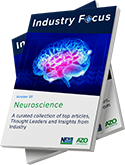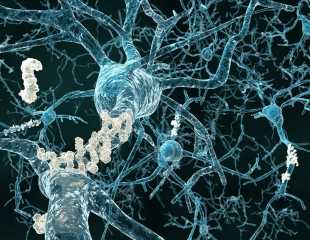Julia TCW, PhD, assistant professor of pharmacology & experimental therapeutics at Boston University Chobanian & Avedisian School of Medicine, has received a five-year, $3.9 million grant from the National Institutes of Health's (NIH) National Institute on Aging. The award will fund her research project, "Elucidating endolysosomal trafficking dysregulation induced by APOE4 in human astrocytes."
Alzheimer's disease (AD) is a progressive neurodegenerative disorder and the most common cause of dementia, affecting more than 5.8 million individuals in the U.S. Scientists have discovered some genetic variants that increase the risk for developing Alzheimer's; the most well-known of these, for people over the age of 65, is APOE4.
Neuroscience eBook

"APOE4 is the major genetic risk factor for Alzheimer's disease, however we do not fully understand how APOE4-driven endolysosomal trafficking defects influence disease risk in human AD brain cells. The goal of this project is to understand the molecular mechanisms of APOE4 and identify targets that can reverse the phenotype," says TCW, who also is a director of the Laboratory of Human Induced Pluripotent Stem Cell Therapeutics.
One of the important questions is whether these endolysosomal pathway genes reveal novel mechanistic defects that can be targeted for therapeutics.
Human induced pluripotent stem cells (iPSC) model application, and the knowledge gained from this proposal, will be essential to the development of novel AD therapeutic modalities."
Julia TCW, PhD, assistant professor of pharmacology & experimental therapeutics at Boston University Chobanian & Avedisian School of Medicine
TCW received her PhD and AM in molecular and cellular biology from Harvard University. She then pursued her postdoctoral research in the department of neuroscience at the Ronald M. Loeb Center for Alzheimer's Disease at Icahn School of Medicine at Mount Sinai, New York. Subsequently she served there as research faculty in the department of genetics and genomic sciences and neuroscience where her research focus was on the development of iPSC models and AD genetics.
In addition to this grant, TCW has been awarded the Druckenmiller Fellowship award from New York Stem Cell Foundation, a K award from the National Institutes of Health-National Institute of Aging, a BrightFocus Foundation grant, and was named a 2022 Toffler Scholar by the Karen Toffler Charitable Trust.
Boston University School of Medicine
Posted in: Cell Biology | Genomics | Medical Condition News
Tags: Aging, Alzheimer's Disease, Brain, Cell, Cellular Biology, Dementia, Genes, Genetic, Genetics, Genomic, Induced Pluripotent Stem Cells, Laboratory, Medicine, Neurodegenerative Disorder, Neuroscience, Pharmacology, Phenotype, Research, Research Project, Stem Cells, Therapeutics
Source: Read Full Article
